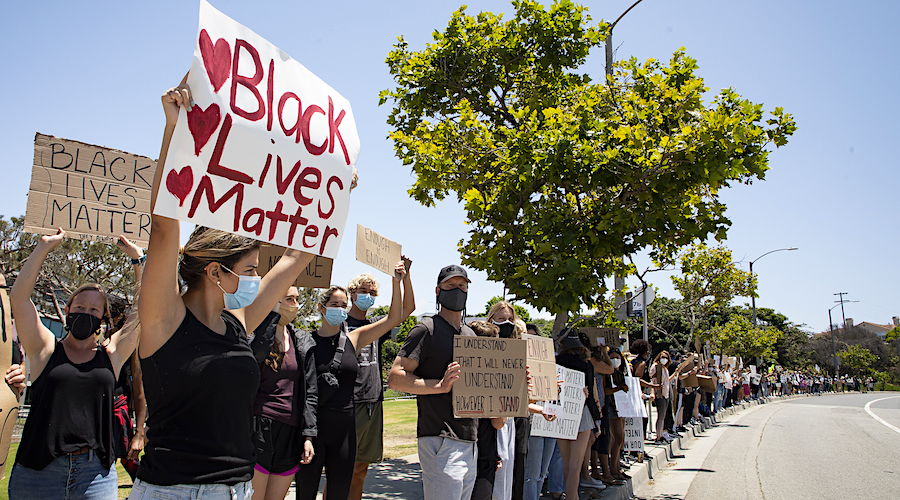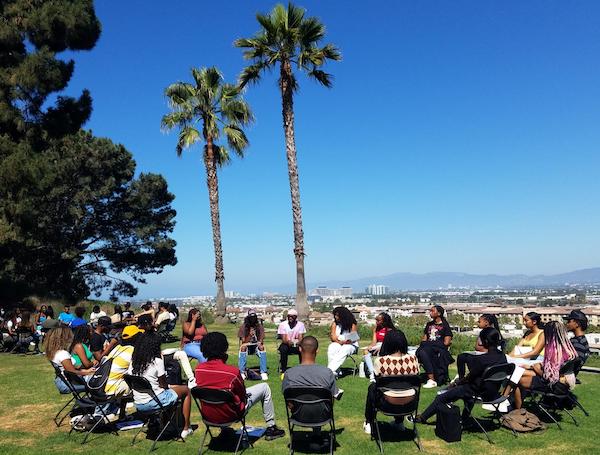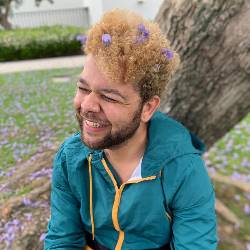
The LMU TRHT Alliance provides a hub for campus and community partners to transform the culture and climate of institutions by catalyzing equitable, reciprocal, and authentic relationships through Ignatian reflection, intergroup dialogue, and © Rx. Racial Healing Circles, which we call Story Circles.
Vision
Inspired by our university mission, the Truth, Racial Healing and Transformation™ (TRHT) Alliance at Loyola Marymount University will transform our campus culture through humanization, dialogue, and belongingness.
Goals
- Serve as a hub to coordinate cross-campus efforts to address instances of impact or harm using a restorative framework:
- Develop a collective understanding among all constituents of the need to prioritize proactive relationship-building as a foundation for making generative conflict possible.
- Leverage the dual appointment of the TRHT Alliance director as University Ombuds to educate the campus community about how to address conflict in supported ways that strengthen relationships and improve campus climate.
- Continue to build capacity among faculty, staff, and students to develop related skills and competencies.
- More transparently articulate connections between the TRHT framework and our University's mission:
- Express the relationship between our commitment to educating the whole person and the power of self-reflective storytelling to deepen empathy and understanding.
- Foster interfaith work as one fruitful pathway toward increasing a sense of belonging among all community members.
- Deepen and sustain relationships grounded in mutuality and reciprocity, informed by the TRHT framework:
- Reckon with the historical role of the Catholic Church in promoting colonialism, slavery, and other racist practices, especially the harm inflicted upon the indigenous peoples of the land our campus occupies.
- Nurture partnerships with entities on campus whose work aligns with the TRHT framework.
- Nurture partnerships with community-based organizations whose work aligns with the TRHT framework.
The TRHT Alliance offers facilitated circles and other workshops by request for departments, units, and other groups at LMU. We also provide capacity-building opportunities for faculty, staff, and students interested in building their capacity to engage in dialogue across differences to facilitate spaces that catalyze growth, change, and a sense of belonging among all community members.
Story Circles
The signature practice of the TRHT national network are Rx Racial Healing Circles, which we call story circles at LMU. Story circles provide opportunities for participants to self-reflect on the experiences that have shaped them and to be witnessed in sharing their experiences with others through a process where they are supported in engaging authentically.

“As Sharon G. Mijares reminds us in her article ‘A Brief History of Circle,’ evidence of ritual circle gatherings for healing dates as far back as 300,000 years ago. People have been gathering in purposeful circles for a very long time. Many Indigenous groups still gather in circles. Examples are the people of First Nations in the Americas and the Maasai people in Kenya. The Stonehenge monument and the one thousand Senegambia stone circles of West Africa (nine of which have been inscribed on the World Heritage list of the United Nations Educational, Scientific, and Cultural Organization) reflect a reverence for the circle formation that spans two millennia…The use of a human circle formation for peacemaking and healing is deeply rooted in traditional practices of Indigenous people the world over. The past thirty years have witnessed a resurgence of the value of circles for restoration and healing in many settings."
-- From "Rx Racial Healing: A Guide to Embracing Our Humanity," by Gail C. Christopher, pp. 97–98.Workshops
The TRHT Alliance at LMU emphasizes building the capacity to engage in community building, communication, and conflict in ways that are generative and that ultimately strengthen relationships and our community. Workshops that focus on a range of related skills can be tailored to the needs of specific groups.
Capacity Building Offerings
In collaboration with Mission and Ministry, LMU Restore, and the Intercultural Facilitators, DEI has a vast variety of offerings that can be facilitated by students, staff, and/or faculty.
Request a Facilitation/Workshop
Whether it’s something that’s listed from our offerings below or something new, please use this link to request a workshop and a member of Capacity Building, Truth, Racial Healing, Transformation Alliance, LMU Restore, and/or the Intercultural Facilitators will be in contact. Request a facilitation/workshop. Learn more about offerings from LMU Restore, Mission and Ministry, and the Intercultural Facilitators.
On-Going Facilitations
Cultural Consciousness Conversations (C3): This cohort of faculty, staff, and administrators from various divisions around campus get together once a month to share stories, learn from one another, examine societal norms and cultural differences, and deepen connections across LMU. Learn more about C3.
Transformation Today (TT): Open to all students, staff, and faculty, Transformation Today is a series of DEI workshops across LMU that promote cultural humility. It brings together the LMU community to further develop a coalition of care centralized around cura personalis. Learn more about TT.
Request Based Facilitations
Bias Incident Response Team Overview: This presentation covers the basics of our BIRT team including what it is, who is on the committee, what the committee does, the process for bias-motivated incidents and more.
Community Building and Problem-Solving Circle: This process invites participants to join a group conversation. A trained, multipartial LMU facilitator invites the group to determine the topic(s) ahead of time. Embodying a meaningful way to enhance and strengthen the campus community, these conversations break down barriers and in the case of problem-solving circles, offer a process for decision-making. The aim is to help build a positive campus climate where everyone can potentially feel heard and valued.
Intergroup Dialogue: Receive a DEI workshop facilitated through a DEI lens that centers topics like collaboration, the characteristics of white supremacy culture, red-lining, and more.
Implicit Bias: Through a mix of short presentations, activities, and discussions, the workshop will explore how implicit biases form in our brains, their impact on other people and society, and strategies we can take to mitigate the implicit biases that we all possess. Learn more about Implicit Bias.
LMU Anti-Racism Workshop Series (LAWS): Launched in Fall 2021, the semester-long program provides a learning environment for faculty and staff to gain a foundational understanding of anti-racism in society and in the university. Learn more about LAWS.
Hiring for Mission and Inclusive Excellence: This initiative provides professional development for search committee members on a variety of topics including the history of LMU, reflections on LMU’s Catholic identity, the Catholic intellectual tradition, ethnic diversity and religious identity in U.S.
Restorative Practices Training: Facilitators are also available to campus partners and student groups by request for facilitating training sessions and presentations on the history, background and philosophy of restorative justice practices and can provide support on how to implement restorative justice practices in your area.
Story Circle: The signature practice of the TRHT national network are Rx Racial Healing Circles, which we call story circles at LMU. Story circles provide opportunities for participants to self-reflect on the experiences that have shaped them and to be witnessed in sharing their experiences with others through a process where they are supported in engaging authentically.
Facilitation Groups
Join one of our facilitation groups.
DEI Facilitator Practice Group: If you have gone through any DEI programs and would like to further contribute to our mission to create a diverse, equitable, and inclusive campus, you can join our Facilitator Practice Group. You will get the opportunity to develop facilitation skills related to conflict engagement, anti-racism, and other areas. Facilitators will receive a stipend for their work and the group is made up of faculty and staff throughout campus.
Intercultural Facilitators (IF): The premise of the program is to develop a group of students, highly skilled in principles of facilitation, to effectively facilitate other students in critical cultural conversations. These conversations lead to an authentic understanding of self, simple but comprehensive ways to engage and inspire community and an honest and inclusive approach to transformative student develop. Learn more about the IF program.
Restorative Justice Facilitators Work Group: The work group provides support for the implementation of restorative justice practices on campus. Through a structured monthly meeting, participants engage in practice and skill building as well as receive support for their department-level implementation of RJ. Through regular circle practice, members also utilize social-emotional learning to build community and connection. The work group contributes to staff retention by providing a space where everyone can feel heard, valued and supported. Learn more about LMU Restore.
Truth Racial Healing Transformation Alliance: The TRHT Alliance offers facilitated circles and other workshops by request for departments, units, and other groups at LMU. We also offer capacity building opportunities for faculty, staff, and students who are interested in building their capacity to engage in dialogue across difference, to facilitate spaces that catalyze growth, change, and a sense of belonging among all community members.
General Community Building
Generative Conflict: Five-Part Listening: This interactive workshop is designed to support you in preparing to engage conflict skillfully and in ways that can strengthen relationships and build community in generative ways. Participants will engage with foundational tools drawn from the traditions of restorative justice practices (RJ/RP) and nonviolent communication (NVC).
Generative Conflict: Difficult Conversations: This interactive session will invite participants to deepen their practice of addressing conflict skillfully through an exploration of conflict avoidance, cultivating our capacity for discernment related how to approach conflict skillfully, and by practicing how to implement distinct strategies for engaging in difficult conversations in productive ways.
Generative Conflict: I-Messages: Participants will practice on an essential strategy for deepening self-awareness through a needs-based framework that can help to de-escalate conflict and invite others into a collaborative mode of relating about an issue or conflict that needs to be addressed. By developing, practicing, and reflecting on I-messages, new insights will be revealed about the root causes of conflict within interpersonal relationships that can lead to creative and collaborative problem-solving.
Generative Conflict: Nervous System Fluency & Assertive Communication Participants will engage in strategies to increase nervous system fluency, which serves as a foundation for self-awareness in how to address conflict skillfully. Opportunities will be provided for further reflection on positionality related to a range of identities and will be supported in interrogating how our perspectives on and experiences with power dynamics influence our ability to communicate assertively.
Restorative Conferences: The Restorative Conference is a safe and structured way to invite people in conflict, along with their supporters, to address a harm. Neither a counseling nor a mediation process, conferencing is a participant-sensitive, straightforward method requiring a trained and multipartial facilitator to help guide a conversation about the incident and how it affects everyone. The facilitator ensures everyone gets a chance to speak, however, the facilitator is not an active participant. The outcomes are approved by all of the participants and when an agreement is reached, a document is written and signed to provide a roadmap for future interactions. The Restorative Conferencing facilitator asks the group three key questions:
Restorative Practices Individual Consultation: An informal meeting with a trained facilitator to talk about a conflict, explore how you're feeling, what your goals are and brainstorm an action plan for next steps. Take the Conflict Profile and/or get some tools for having difficult conversations and identify ways to follow up on what you're currently experiencing.
Restorative Practices Group or Organization Consultation: A multipartial staff member is available to meet and work with student groups and Registered Student Organizations, faculty, and staff. This resource can take multiple forms, all beginning with a consultation with the multipartial staff member to listen to the concern, assist with identifying goals and collaboratively generating options for moving forward. The consultation can take place with an individual or multiple members of the group or organization.
Restorative Practices Facilitation: An informal process that assists groups in respectful dialogue, collaborative decision-making, establishing, or resetting group norms and expectations. A multipartial staff member guides the facilitation to help two or more people achieve mutual understanding or reach a decision. The goal of facilitation is to help individuals and groups efficiently and collaboratively work together toward their larger common goals and interests.
Generative Conflict: Presupposition and Multipartiality: This dynamic workshop invites participants to explore presupposition through powerful psychological concepts like implicit bias, cognitive distortions, neutrality, and multipartiality in a hands-on, interactive way. Through engaging activities, we will uncover ideas that twist our perception of reality and explore how they shape our interactions. With practical tools and thought-provoking discussions, you’ll leave empowered to challenge your own thinking, become a more empathetic communicator, and create more inclusive spaces wherever you go.
Assessment Driven Coaching
Prices cover the license for the assessment and require a 1:1 meeting with a trained facilitator.
The CDP-I report contains graphs measuring constructive behaviors, destructive behaviors, and hot buttons. It is accompanied by a 40-page Development Guide which gives suggestions for improving behaviors and cooling hot buttons.
- Conflict-Dynamics Profile- Individual Report License $25
The CDP-360 report is much more comprehensive. In addition to containing graphs measuring constructive behaviors, destructive behaviors, and hot buttons, it also has narrative comments from other raters, measures of the organizational importance of various conflict behaviors, and indications of how the individual is viewed during different stages of conflict. Accompanying the CDP-360 report is a 115-page Development Guide with suggestions for development, recommended resources, and guidelines for successful action planning.
- Conflict-Dynamics Profile – 360 Individual Report License $85
- Conflict-Dynamics Profile – 360-Group Report License $100
Intercultural Development Inventory®: The IDI measures individuals’ and groups’ placement along the Intercultural Development Continuum (IDC). The IDC describes orientations toward cultural differences ranging from the more monocultural mindsets of Denial and Polarization through the transitional orientation of Minimization to the intercultural mindsets of Acceptance and Adaptation.
- $20 per license per faculty and staff member
- $13 per license per student
Intercultural Conflict Style Inventory®: The Intercultural Conflict Style Inventory is an 18-item questionnaire that is available online (in multiple languages) and in print (English language) versions. The ICS Inventory is an easy to use, cross-culturally validated assessment of an individual’s approach to communicating, resolving conflicts and solving problems. The ICS Inventory takes 15 minutes to complete. The online ICS Inventory has been professionally “back translated” into multiple languages using rigorous, scientific protocols to insure each of the items possess both linguistic and conceptual equivalency. This ensures that the various language versions of the online ICS Inventory have similar meaning across cultures. We recommend the ICS Inventory be used with individuals 15 years of age or higher.
- $16 per license for students, staff, and faculty
Framework
The TRHT framework helps communities heal and produce actionable change. From the beginning, TRHT was designed by the community and through collaboration. Community-led collaboration – that is cross-racial, intergenerational, and cross-sector – remains the centerpiece of all TRHT efforts.
Foundational Areas
All TRHT communities address the following foundational areas:
Narrative Change
False narratives hamper our ability to understand our world and relationships as they are, leading us to create and reinforce untrue perceptions. A complete story needs to be presented in school curricula, news media, movies, television, radio, digital media, gaming platforms, cultural institutions, and in the personal histories told within families. This process influences our perspectives, perceptions, behaviors, and interactions with one another so that we can more effectively create change.
Racial Healing and Relationship Building
We are focusing on ways for all of us to heal from the wounds of the past, to build mutually respectful relationships across racial and ethnic lines that honor and value each person’s humanity, and to build trusting intergenerational and diverse community relationships that better reflect our shared humanity.
Pillars
Communities also choose to pursue work around one or all of the following pillars:
Separation
We are examining and finding ways to address segregation, colonization, and concentrated poverty in neighborhoods to ensure equitable access to health, education, and jobs.
Law
Review discriminatory civil and criminal laws and the public policies that result from them and recommend solutions that will produce a just application of the law.
Economy
Studying structured inequality and barriers to economic opportunities and recommending approaches to create an equitable society.
Truth, Racial Healing, and Transformation
- TRHT Philosophy & Framework
- We Hold These Truths: Dismantling Racial Hierarchies; Building Equitable Communities
- © Rx Racial Healing Circles
- National Day of Racial Healing
- TRHT Campus Centers' Projects
Restorative Culture
- Southern CA Restorative Justice Consortium
- Gathering Power
- Conflict Transformation and Restorative Justice
- In It Together – A Framework for Conflict Transformation
- Body Centered Transformation
- Accountable Communities Consortium
- Creating a Restorative Campus
- Developing a More Restorative Pedagogy
Antiracism
- LMU’s Antiracism Project
- Mission & Ministry’s Compiled Resources
- Characteristics of White Supremacy Culture
- AWARE-LA
- "The Benefits of Collective Action" by Heather McGhee
Our Partners
- The Restorative Justice Project @ LMU’s Center for Urban Resilience
- CSJ Center for Reconciliation and Justice
- LMU Restore
- Inclusive History and Images Project
- Family of Schools
- Pam Rector Center for Service and Action
- Intercultural Facilitators Program
- Center for Religion & Spirituality
- Psychology Applied Research Center (PARC)
Jamal Epperson

they/them/their
Assistant Director of DEI Initiatives and Truth, Racial Healing, and Transformation (TRHT) Center Alliance
(310) 258-7966 | jamal.epperson@lmu.edu
Jamal Epperson directs the Truth, Racial Healing, and Transformation (TRHT) Center Alliance at LMU, which is part of a national network of TRHT campus centers hosted by the American Association of Colleges and Universities. They previously served as a Resident Director in the Student Housing Office is a current graduate student at the University of San Francisco's Doctorate of Education International Multicultural Education program with a concentration in Human Rights Education where they focused on transformative restorative justice in higher education. Mx. Epperson is an abolitionist and transformative restorative justice facilitator who centers love in cultivating healthy relationships that promote liberation and creation. Through their work in BFSA and the LGBTQ+ FSN Jamal co-founded the Mixed-Roots Collective to create space for multiracial and transracially adopted individuals to have a space for liberation, healing, and love.